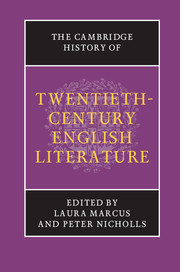Book contents
- Frontmatter
- Introduction
- PART ONE WRITING MODERNITY
- PART TWO THE EMERGING AVANT-GARDE
- PART THREE MODERNISM AND ITS AFTERMATH, 1918–1945
- PART FOUR POST-WAR CULTURES, 1945–1970
- PART FIVE TOWARDS THE MILLENNIUM, 1970–2000
- 32 The Seventies and the cult of culture
- 33 Feminism and writing: the politics of culture
- 34 The half-lives of literary fictions: genre fictions in the late twentieth century
- 35 Theatre and politics
- 36 Irish literature: tradition and modernity
- 37 Scottish literature: Second Renaissance
- 38 Towards devolution: new Welsh writing
- 39 British–Jewish Writing and the turn towards diaspora
- 40 Fiction and postmodernity
- 41 Postcolonial fictions
- 42 Writing lives
- 43 Poetry after 1970
- 44 Ending the century: literature and digital technology
- Bibliography
- Index
- References
33 - Feminism and writing: the politics of culture
from PART FIVE - TOWARDS THE MILLENNIUM, 1970–2000
Published online by Cambridge University Press: 28 March 2008
- Frontmatter
- Introduction
- PART ONE WRITING MODERNITY
- PART TWO THE EMERGING AVANT-GARDE
- PART THREE MODERNISM AND ITS AFTERMATH, 1918–1945
- PART FOUR POST-WAR CULTURES, 1945–1970
- PART FIVE TOWARDS THE MILLENNIUM, 1970–2000
- 32 The Seventies and the cult of culture
- 33 Feminism and writing: the politics of culture
- 34 The half-lives of literary fictions: genre fictions in the late twentieth century
- 35 Theatre and politics
- 36 Irish literature: tradition and modernity
- 37 Scottish literature: Second Renaissance
- 38 Towards devolution: new Welsh writing
- 39 British–Jewish Writing and the turn towards diaspora
- 40 Fiction and postmodernity
- 41 Postcolonial fictions
- 42 Writing lives
- 43 Poetry after 1970
- 44 Ending the century: literature and digital technology
- Bibliography
- Index
- References
Summary
‘Women are writing, and the air is heavy with expectation: What will they write that is new?’ The expectations to which Kristeva refers in her seminal essay ‘Women’s Time’ (1981) are the subject of this chapter. The inauguration of ‘women’s time’ had begun a decade before, but Kristeva saw that the time had also come to reflect upon some of the more metaphysical, as well as political, implications of women’s entry into historical temporality. By 1981, the Women’s Liberation Movement had splintered into a bewildering diversity of identity politics around issues of race, sexuality and class, but feminist writing had changed for all time the political and literary landscape. The burning issue thrown up by this maelstrom, however, was the question of what it is to be a woman and what is meant by women’s writing. In the same year, 1981, Elaine Showalter’s essay ‘Feminist Criticism in the Wilderness’ tempered Kristeva’s utopian sense of expectation in suggesting that women’s writing has always been, and will remain, essentially double-voiced: inevitably an articulation of both the muted and the dominant, the old and the new. Moreover, she implied that feminist re-visioning (to use Adrienne Rich’s term) will require both an impulse towards, and resistance to, the concept of the feminine, to identity as woman. Showalter’s essay performatively demonstrates her own undecidability. Proceeding in sections, each headed by citations from literary mothers, dead and alive, her argument develops in a mode of textual parallax, woven through and striated by a female chorus whose ghostly voices beckon towards unity and solidarity and simultaneously threaten to break into cacophony and difference.
- Type
- Chapter
- Information
- The Cambridge History of Twentieth-Century English Literature , pp. 600 - 617Publisher: Cambridge University PressPrint publication year: 2005

